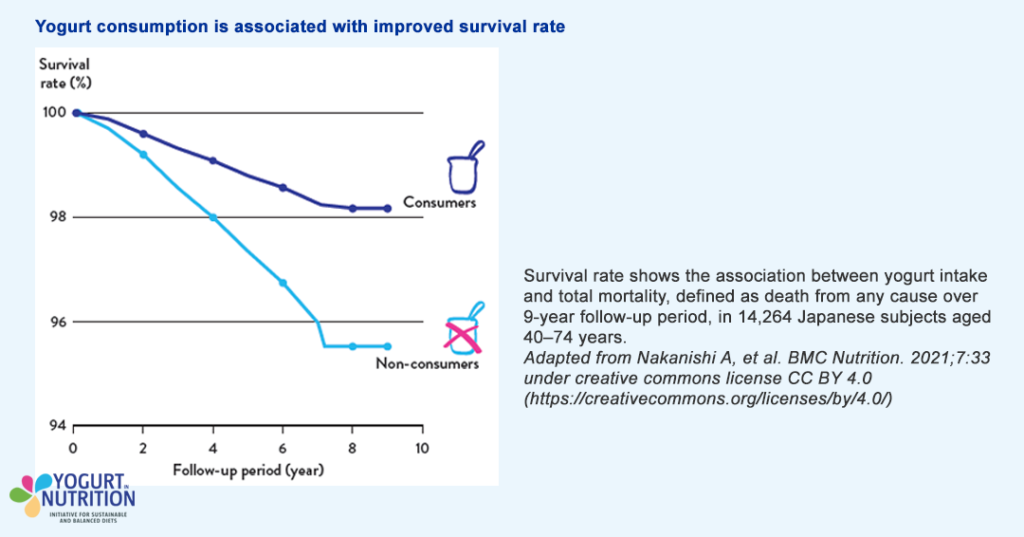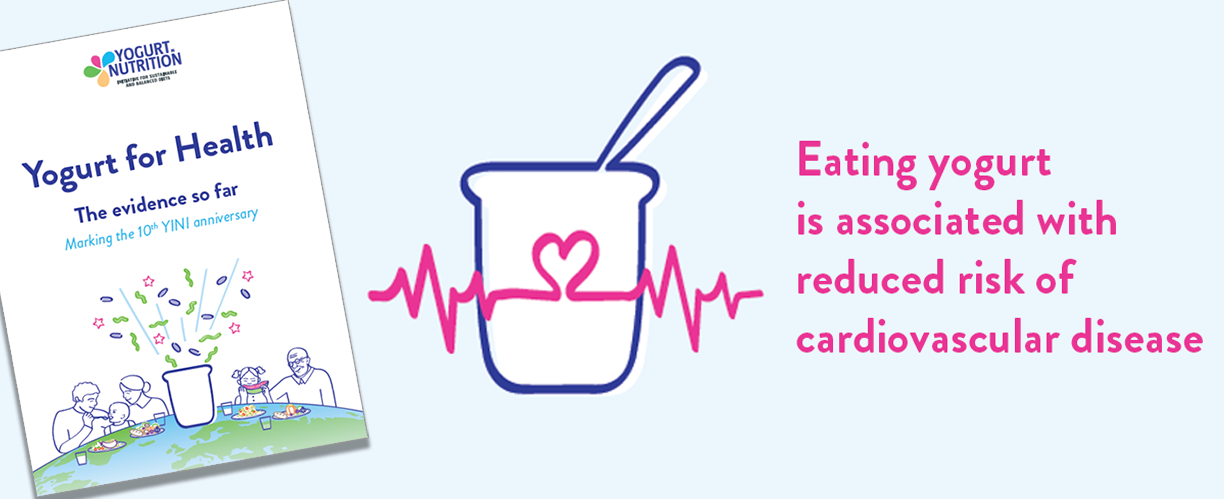Dairy products such as yogurt have consistently been linked with either neutral or beneficial effects on risk of cardiovascular disease (CVD), a finding highlighted by multiple literature reviews and a metaanalysis.
Yogurt may reduce the risk of high blood pressure
Among adults included in the USA NHANES (1999–2014) survey, the prevalence of hypertension was 20% lower for those that consumed yogurt, compared with non-consumers, and blood pressure levels were significantly lower.
Another study of adults in the USA found that greater intakes of dairy, low-fat/fat-free dairy, low-fat/skimmed milk and yogurt were associated with a lower risk of developing high blood pressure per year.
Eating one extra serving of yogurt per week was related to a 6% lower risk of developing high blood pressure.
Yogurt may reduce risk of CVD
Yogurt consumption is associated with lower CVD risk.
A meta-analysis of 10 cohort studies from the USA, Sweden, The Netherlands, Finland, Australia and the UK, including 385,122 participants found a 17% decreased risk of CVD with fermented dairy food intake. Sub-group analysis found that yogurt consumption was associated with a 22% fall in CVD risk.
A study of 7,679 Australian women found that high yogurt intake (>70 g or ~2 ounces/day) was associated with 16% lower CVD risk over 15 years compared with no intake.
Among a Greek population (N=3042), a 20–30% lower CVD risk over 10 years was found per 200 g or ~7 ounces/day yogurt consumption, with the greater effect seen in women.
A French study of 104,805 adults from the NutriNet-Santé cohort (2009–2019) found no association between overall dairy intake and CVD risk over 5 years but did find that eating at least 160 g or ~6 ounces/day of fermented dairy (yogurt and cheese) was associated with 19% lower risk of cerebrovascular disease compared with intakes of less than 57 g/day (~2 ounces/day).
In people with high blood pressure:
- Consuming two or more servings of yogurt per week, especially when part of a healthy diet, was associated with a reduced risk of heart attack or stroke compared with eating less than one serving per month.
- Among those eating two or more servings of yogurt per week, women had a 17% lower CVD risk and men had a 21% lower risk compared with those who ate less than one serving per month.
Children and teenagers could benefit too
In European adolescents, consumption of milk and yogurt was inversely associated with being overweight and positively associated with cardiorespiratory fitness.
Dairy consumption was inversely associated with CVD risk score in European girls aged 12.5–17.5
years.
Yogurt may reduce mortality risk
Yogurt consumption is associated with reduced risk of all-cause and CVD mortality across population-based studies.
A meta-analysis of 17 cohort studies of 896,871 participants, with 75,791 deaths, found the highest intake of yogurt was associated with a 7% lower risk of death from all causes and 11% lower risk of death from CVD than the lowest intake. Each additional serving of yogurt per day (244 g or ~8 ounces) was associated with a 7% reduced risk of all-cause mortality and 14% reduced risk of CVD mortality.
While the association between yogurt consumption and all-cause mortality has met with mixed results from large cohort studies in the past,152,162 more recent studies show an association with reduced risk of mortality.
A meta-analysis of 235,676 participants in eight cohort studies found that yogurt intake of at least 200 g/day (~7 ounces/day) was associated with12% lower all-cause mortality and 13% lower risk of CVD mortality compared with lower yogurt intake.
In the Prospective Urban Rural Epidemiology (PURE) study (2003–2018) of 136,384 people aged 35–70 years from 21 countries in five continents, higher intake of yogurt (>1 serving/ day) was associated with a 14% lower risk of death or major cardiovascular event, 17% lower risk of total mortality and 10% lower risk of major CVD compared with no intake.
A large population survey of adults (N=32,625) in the USA NHANES (1999–2014) study found a
17% reduced risk for all-cause mortality with yogurt intake over 8 years. The health benefits of yogurt were more pronounced among women, people aged ≥60 years, and non-Hispanic Black people.
A Japanese population study (N=14,264) showed a 28–30% reduction in mortality over 9 years with
increasing yogurt intake among people aged 40–74 years.

How might yogurt reduce CVD risk?
Blood pressure modulation following the consumption of yogurt may be linked to an association with
improved lipid profiles, reduced BMI, or the ability to produce anti-hypertensive peptides that inhibit angiotensin-converting enzyme, which plays a crucial role in blood pressure regulation.
The association between yogurt consumption and reduced risk of CVD may be due to the protective properties of some components.
Yogurt and other dairy products are rich in micronutrients and proteins, some of which have
been shown to lower blood pressure.
Low-grade inflammation underlies the pathology of CVD, and some saturated fatty acids found in dairy products (e.g., lauric acid) may have antiinflammatory effects.
Calcium, potassium and magnesium found in yogurt have been linked to a reduced risk of stroke.
The dairy matrix may contribute to the beneficial effects of yogurt and other dairy products and determine the fat bioavailability.
Fermented milk products such as probioticcontaining yogurts have a high antioxidant potential and could play a part in healthy and active ageing.
“Yogurt consumption is associated with reduced risk of cardiovascular disease – and large population-based studies reveal a link between yogurt consumption and reduced risk of death from cardiovascular and all causes”
References :
- Melini F, Melini V, Luziatelli F, et al. Health-promoting components in fermented foods: an up-to-date systematic review. Nutrients. 2019;11:1189.
- He M, Yang YX, Han H, et al. Effects of yogurt supplementation on the growth of preschool children in Beijing suburbs. Biomed Environ Sci. 2005;18:192–7.
- Lau E, Sergio Neves J, Ferreira-Magalhaes M, et al. Probiotic ingestion, obesity, and metabolic-related disorders: results from NHANES, 1999–2014. Nutrients. 2019;11:1482.
- Moreno LA, Bel-Serrat S, Santaliestra-Pasías A, et al. Dairy products, yogurt consumption, and cardiometabolic risk in children and adolescents. Nutr Rev. 2015;73(Suppl 1):8–14.
- Drouin-Chartier JP, Brassard D, Tessier-Grenier M, et al. Systematic review of the association between dairy product consumption and risk of cardiovascular-related clinical outcomes. Adv Nutr. 2016;7:1026–40.
- Givens DI. Saturated fats, dairy foods and health: a curious paradox? Nutr Bull. 2017;42:274–82.
- Guo J, Astrup A, Lovegrove JA, et al. Milk and dairy consumption and risk of cardiovascular diseases and all-cause mortality: dose-response meta-analysis of prospective cohort studies. Eur J Epidemiol. 2017;32:269–87.
- Lordan R, Tsoupras A, Mitra B, et al. Dairy fats and cardiovascular disease: do we really need to be concerned? Foods. 2018;7:29.
- Wang H, Fox CS, Troy LM, et al. Longitudinal association of dairy consumption with the changes in blood pressure and the risk of incident hypertension: the Framingham Heart Study. Br J Nutr. 2015:114:1887–99.
- Zhang K, Chen X, Zhang L, et al. Fermented dairy foods intake and risk of cardiovascular diseases: a meta-analysis of cohort studies. Crit Rev Food Sci Nutr. 2020;60:1189–94.
- Buziau AM, Soedamah-Muthu SS, Geleijnse JM, et al. Total fermented dairy food intake is inversely associated with cardiovascular disease risk in women. J Nutr. 2019;149:1797–1804.
- Kouvari M, Panagiotakos DB, Chrysohoou C, et al. Dairy products, surrogate markers, and cardiovascular disease; a sex-specific analysis from the ATTICA prospective study. Nutr Metab Cardiovasc Dis. 2020;30:2194e2206.
- Sellem L, Srour B, Jackson KG, et al. Consumption of dairy products and CVD risk: results from the French prospective cohort NutriNet-Santé. Br J Nutr. 2022;127:752–62.
- Buendia JR, Li Y, Hu FB, et al. Regular yogurt intake and risk of cardiovascular disease among hypertensive adults. Am J Hypertens. 2018;31:557–65.
- Bel-Serrat S, Mouratidou T, Jiménez-Pavón D, et al. Is dairy consumption associated with low cardiovascular disease risk in European adolescents? Results from the HELENA Study. Pediatr Obes. 2014;9:401–10.
- Tutunchi H, Naghshi S, Naemi M, et al. Yogurt consumption and risk of mortality from all causes, CVD and cancer: a comprehensive systematic review and dose-response meta-analysis of cohort studies. Public Health Nutr. 2023;26: 1196–209.
- Soedamah-Muthu SS, de Goede J. Dairy consumption and cardiometabolic diseases: systematic review and updated meta-analyses of prospective cohort studies. Curr Nutr Rep. 2018;7:171–82.
- Gao X, Jia H-Y, Chen G-C, et al. Yogurt Intake Reduces All-Cause and Cardiovascular Disease Mortality: A Meta-Analysis of Eight Prospective Cohort Studies. Chin J Integr Med. 2020;26:462–8.
- Dehghan M, Mente A, Rangarajan S, et al. Association of dairy intake with cardiovascular disease and mortality in 21 countries from five continents (PURE): a prospective cohort study. Lancet. 2018;392:2288–97.
- Lin P, Gui X, Liang Z, Wang T. Association of yogurt and dietary supplements containing probiotic consumption with all-cause and cause-specific mortality in US adults: a population-based cohort study. Front Nutr. 2022;9:803076.
- Nakanishi A, Homma E, Osaki T, et al. Association between milk and yogurt intake and mortality: a community-based cohort study (Yamagata study). BMC Nutrition. 2021;7:33.
- Kim H-K, Kim S-H, Jang C-S, et al. The combined effects of yogurt and exercise in healthy adults: Implications for biomarkers of depression and cardiovascular diseases. Food Sci Nutr. 2018;6:1968–74.



